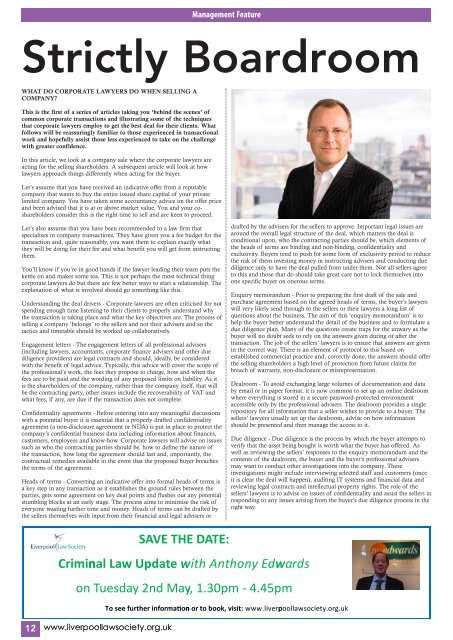Liverpool Law Mar 2017
You also want an ePaper? Increase the reach of your titles
YUMPU automatically turns print PDFs into web optimized ePapers that Google loves.
Management Feature<br />
Strictly Boardroom<br />
WHAT DO CORPORATE LAWYERS DO WHEN SELLING A<br />
COMPANY?<br />
This is the first of a series of articles taking you ‘behind the scenes’ of<br />
common corporate transactions and illustrating some of the techniques<br />
that corporate lawyers employ to get the best deal for their clients. What<br />
follows will be reassuringly familiar to those experienced in transactional<br />
work and hopefully assist those less experienced to take on the challenge<br />
with greater confidence.<br />
In this article, we look at a company sale where the corporate lawyers are<br />
acting for the selling shareholders. A subsequent article will look at how<br />
lawyers approach things differently when acting for the buyer.<br />
Let’s assume that you have received an indicative offer from a reputable<br />
company that wants to buy the entire issued share capital of your private<br />
limited company. You have taken some accountancy advice on the offer price<br />
and been advised that it is at or above market value. You and your coshareholders<br />
consider this is the right time to sell and are keen to proceed.<br />
Let’s also assume that you have been recommended to a law firm that<br />
specialises in company transactions. They have given you a fee budget for the<br />
transaction and, quite reasonably, you want them to explain exactly what<br />
they will be doing for their fee and what benefit you will get from instructing<br />
them.<br />
You’ll know if you’re in good hands if the lawyer leading their team puts the<br />
kettle on and makes some tea. This is not perhaps the most technical thing<br />
corporate lawyers do but there are few better ways to start a relationship. The<br />
explanation of what is involved should go something like this.<br />
Understanding the deal drivers - Corporate lawyers are often criticised for not<br />
spending enough time listening to their clients to properly understand why<br />
the transaction is taking place and what the key objectives are. The process of<br />
selling a company ‘belongs’ to the sellers and not their advisers and so the<br />
tactics and timetable should be worked up collaboratively.<br />
Engagement letters - The engagement letters of all professional advisers<br />
(including lawyers, accountants, corporate finance advisers and other due<br />
diligence providers) are legal contracts and should, ideally, be considered<br />
with the benefit of legal advice. Typically, this advice will cover the scope of<br />
the professional’s work, the fees they propose to charge, how and when the<br />
fees are to be paid and the wording of any proposed limits on liability. As it<br />
is the shareholders of the company, rather than the company itself, that will<br />
be the contracting party, other issues include the recoverability of VAT and<br />
what fees, if any, are due if the transaction does not complete.<br />
Confidentiality agreements - Before entering into any meaningful discussions<br />
with a potential buyer it is essential that a properly drafted confidentiality<br />
agreement (a non-disclosure agreement or NDA) is put in place to protect the<br />
company’s confidential business data including information about finances,<br />
customers, employees and know-how. Corporate lawyers will advise on issues<br />
such as who the contracting parties should be, how to define the nature of<br />
the transaction, how long the agreement should last and, importantly, the<br />
contractual remedies available in the event that the proposed buyer breaches<br />
the terms of the agreement.<br />
Heads of terms - Converting an indicative offer into formal heads of terms is<br />
a key step in any transaction as it establishes the ground rules between the<br />
parties, gets some agreement on key deal points and flushes out any potential<br />
stumbling blocks at an early stage. The process aims to minimise the risk of<br />
everyone wasting further time and money. Heads of terms can be drafted by<br />
the sellers themselves with input from their financial and legal advisers or<br />
drafted by the advisers for the sellers to approve. Important legal issues are<br />
around the overall legal structure of the deal, which matters the deal is<br />
conditional upon, who the contracting parties should be, which elements of<br />
the heads of terms are binding and non-binding, confidentiality and<br />
exclusivity. Buyers tend to push for some form of exclusivity period to reduce<br />
the risk of them investing money in instructing advisers and conducting due<br />
diligence only to have the deal pulled from under them. Not all sellers agree<br />
to this and those that do should take great care not to lock themselves into<br />
one specific buyer on onerous terms.<br />
Enquiry memorandum - Prior to preparing the first draft of the sale and<br />
purchase agreement based on the agreed heads of terms, the buyer’s lawyers<br />
will very likely send through to the sellers or their lawyers a long list of<br />
questions about the business. The aim of this ‘enquiry memorandum’ is to<br />
help the buyer better understand the detail of the business and to formulate a<br />
due diligence plan. Many of the questions create traps for the unwary as the<br />
buyer will no doubt seek to rely on the answers given during or after the<br />
transaction. The job of the sellers’ lawyers is to ensure that answers are given<br />
in the correct way. There is an element of protocol to this based on<br />
established commercial practice and, correctly done, the answers should offer<br />
the selling shareholders a high level of protection from future claims for<br />
breach of warranty, non-disclosure or misrepresentation.<br />
Dealroom - To avoid exchanging large volumes of documentation and data<br />
by email or in paper format, it is now common to set up an online dealroom<br />
where everything is stored in a secure password-protected environment<br />
accessible only by the professional advisers. The dealroom provides a single<br />
repository for all information that a seller wishes to provide to a buyer. The<br />
sellers’ lawyers usually set up the dealroom, advise on how information<br />
should be presented and then manage the access to it.<br />
Due diligence - Due diligence is the process by which the buyer attempts to<br />
verify that the asset being bought is worth what the buyer has offered. As<br />
well as reviewing the sellers’ responses to the enquiry memorandum and the<br />
contents of the dealroom, the buyer and the buyer’s professional advisers<br />
may want to conduct other investigations into the company. These<br />
investigations might include interviewing selected staff and customers (once<br />
it is clear the deal will happen), auditing IT systems and financial data and<br />
reviewing legal contracts and intellectual property rights. The role of the<br />
sellers’ lawyers is to advise on issues of confidentiality and assist the sellers in<br />
responding to any issues arising from the buyer’s due diligence process in the<br />
right way.<br />
<br />
<br />
<br />
<br />
<br />
<br />
<br />
<br />
<br />
<br />
- <br />
<br />
<br />
<br />
<br />
<br />
<br />
<br />
<br />
12 www.liverpoollawsociety.org.uk

















